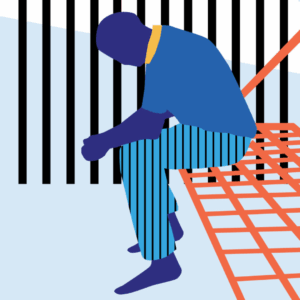
New research finds that the death penalty can deepen trauma for victims and their families
- News
- 24 Sep 2025
A new report published by The Death Penalty Project and the University of Oxford’s Death Penalty Research Unit reveals that capital punishment systems can inflict further trauma on victims, rather than providing for their complex and varied needs.
In countries around the world that continue to hand down death sentences and execute citizens who commit serious crimes, there are a few common justifications for retaining the punishment: to dissuade other individuals from committing serious crimes, to satisfy a public desire for executions and to meet the needs of victims of crime and their families.
Existing research has countered widespread beliefs that the death penalty effectively deters people from offending, uncovered the complexities of public opinion on the death penalty and laid bare the cruelty of the punishment, including how it discriminates against the most marginalised people in society.
But, until now, very few studies have explored whether death sentences and executions actually satisfy the needs of victims of crime and their loved ones – also known as co-victims – in the aftermath of a traumatic event.
A new report conducted by Dr Amelia Inglis at the University of Oxford addresses this critical knowledge gap through examining co-victim experiences of the death penalty. Dr Inglis said:
“Both sides of the death penalty debate agree that addressing the needs of co-victims in the aftermath of a traumatic crime is of utmost concern. However, much of the debate has historically relied on assumptions about co-victims experiences and views on capital punishment. Through a collection of in-depth, qualitative interviews, we have gained nuanced and real-world insights into how co-victims experience the capital punishment system. As a result, we now have a deeper understanding of their complex and diverse opinions and needs.”
The findings of Dr Inglis’ original empirical study challenge widely held assumptions that capital punishment is necessary for co-victims in two ways.
Firstly, despite claims by retentionists that the death penalty, as a form of retributive – or “an eye for an eye” – justice, is necessary for healing, Dr Inglis’ research reveals that the death penalty can in fact have the opposite effect, inflicting further harm and retraumatising co-victims. This is in part due to agonising but often unavoidable delays in proceedings characterised by procedural safeguards as an individual sentenced to death then moves through appeals processes.
“I didn’t know if I could get through another [trial]. I sometimes could not eat for days. [They] threw off my sleeping […] I mean you think I cried a lot before? Oh my gosh, you know, another time to go through this? I didn’t know if I had the strength. […] I’m going, ‘Is the Florida justice system putting me through this again? […] Please don’t make me and my family go through this again. I’m gonna have to testify again. Oh, my God. I have to go look at the pictures. I have to go through every detail of watching the knife go into my father, the scenes of my father trying to breathe and save, you know, draw him away from me and try to save me’, and it was horrible because, you know, I think, I’m pretty sure that the justice system because they elongated it, you know, so long that it, it made my health, medical worse in the long run.”
Sarah (not her real name), as both a victim-survivor and a witness to her father’s murder, was required to attend each trial, describing the experience as “ten and a half years of trials of hell”.
Secondly, the report shows that families of murder victims do not share the same views, and their feelings can shift over time. A death penalty does not account for diversity and evolution of needs, and can ultimately tie families – including those who are undecided, have changed their minds or have always been against death sentences – to a long, painful legal process that often disrupts and delays the recovery journey.
Saul Lehrfreund, Co-Executive Director, The Death Penalty Project, said:
“The conclusions of this important report are clear: the death penalty serves no one. These findings show that capital punishment systems, alongside a litany of other well-documented flaws, can cause further trauma to those it claims to support. This research should fuel us to learn how we might develop a sensitive criminal justice response to heinous offences which does not inflict damage to all those who come in contact with it.”
Note To Editors
Read the full report via this link.
About
The author
Dr Amelia Inglis holds an MSc and DPhil in criminology from the University of Oxford. Her empirical research focuses on the experiences of murder victim family members in the United States. Challenging common assumptions held by proponents of the death penalty, her work reveals how the capital punishment system – particularly the protracted appeals process, which accompanies nearly all death sentences and is therefore experienced by most victims – can contribute to the re-victimisation of those it claims to support. Her findings suggest that the capital appeals process has the potential to exacerbate the suffering of bereaved families and to delay their grieving and recovery processes, casting significant doubt on the potential for capital punishment to provide therapeutic benefits to victims loved ones.
The Death Penalty Project
The Death Penalty Project (DPP) is a legal action NGO with special consultative status before the United Nations Economic and Social Council. Driven by a belief that the death penalty is cruel and often discriminates against the poorest and most disadvantaged members of society, the organisation works to safeguard the rights of those facing the death penalty and other vulnerable people. For over three decades, DPP has been working in more than 30 countries to end and restrict the use of capital punishment, protecting thousands of people from execution. DPP commissions, supports and publishes independent academic research examining attitudes towards the death penalty, using original data from public opinion surveys and other empirical research to engage in dialogue with policymakers and politicians, and to challenge popular misconceptions around the death penalty.
The Death Penalty Research Unit
Part of the University of Oxford’s Centre for Criminology, the Death Penalty Research Unit (DPRU) focuses on the retention, administration and politics of the death penalty worldwide. DPRU aims to understand the rationales for the death penalty, how it is used in practice and its diverse application and impact on communities. DPRU is committed to working with partners in various regions on collaborative production and dissemination of empirical and theoretical knowledge. This work is not only aimed at elucidating the law and practice of capital punishment worldwide, but at challenging it, with the explicit aim of abolition or, failing that, progressive restriction.
Contact
Kate Arthur, Communications Lead, The Death Penalty Project, [email protected]
















